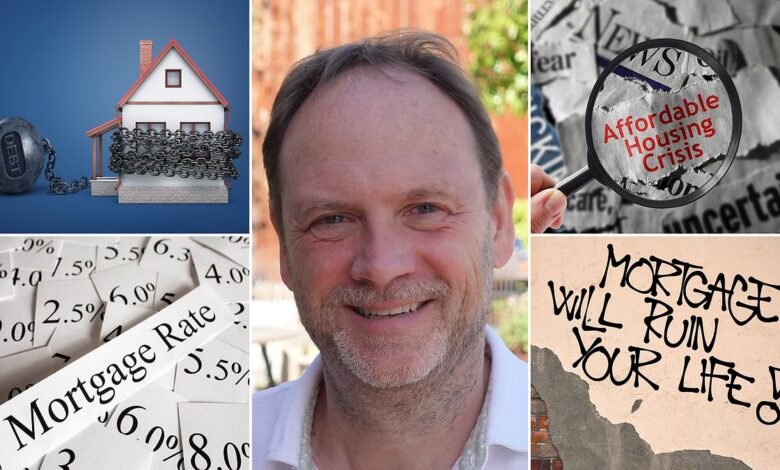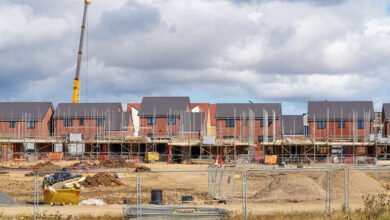How would YOU fix the housing market? We need 30-year fixed rates, says mortgage boss Arjan Verbeek

- Each week we ask an expert to explain the crisis and offer their solutions
- This week it is the turn of Arjan Verbeek, founder of mortgage lender Perenna
- He says mortgage rates should be fixed for life, instead of two or five years
Whether it’s unaffordable house prices, higher mortgage rates, soaring rents or increased levels of homelessness, the housing market appears to be stuck in a never-ending crisis.
There remains an insatiable appetite to buy property. Many of those who don’t own aspire to, and pour their life savings towards achieving it.
It is a dream that continues to move further out of reach for many, as the chronic under-supply of properties means house prices rise and rents increase.
As for those who already own, they tend to want more. Whether that means buying a bigger and better home, purchasing a holiday home or investing in buy-to-lets, the British obsession with acquiring property doesn’t stop at the first one.
Owning property has become synonymous with both wealth creation and wealth preservation and as the money keeps piling in, the prices keep going up.
Government interventions often appear to add fuel to the fire. Stamp duty holidays, Help to Buy, Right to Buy and other schemes were meant to help more people on to the ladder.
But while many of those initiatives were successful, they also had the effect of pushing up house prices further for those that came after.
Worst of all, homelessness is rising. More than 300,000 people are recorded as homeless in England, according to research by the charity Shelter, with many in temporary accommodation.
In This is Money’s new series, we speak to a property expert every week to ask them what is wrong with Britain’s housing market – and how they would fix it.
This week we spoke to Arjan Verbeek, founder and chief executive of mortgage lender Perenna.
Arjan’s career in financial services has included setting up billion-pound funding programmes for various institutions and has assessed mortgage markets all around the world including Canada, US, Australia, and Denmark.
He has held positions at BNP Paribas and Barclays Capital and was vice president at Moody’s analysing mortgage risk.
Related Articles
HOW THIS IS MONEY CAN HELP
Does Britain have a housing crisis?
Arjan Verbeek replies: Yes. We are in a housing crisis that impacts all generations.
Young people are priced out of homeownership, mortgage prisoners are trapped on obscenely high standard variable rates (SVRs) and over-55s face discrimination, often denied mortgages outright because of their age.
The UK mortgage market is uniquely flawed as it’s overly dependent on short-term, ‘cheap’ products. This structure bars individuals of all ages from buying the home they want.
In countries like the Netherlands, Denmark and the US, where long-term fixed rate mortgages are the norm, this isn’t the case.
In those countries, borrowers have a wider range of mortgage options, including long-term fixed rate mortgages which offer protection entirely from interest rate shocks.
Interest rate hikes over the last few years have exposed the risks associated with short-term fixed rate mortgage products in the UK.
By the end of 2024, more than 1.6 million homeowners will reach the end of their fixed-term deals and experience significant increases to their monthly repayments due to the flawed design of their mortgage product.
We’re trapped in an endless cycle, which will continue if we don’t fundamentally change our mortgage market.
It’s a tragedy that the average age of first time buyers continues to rise. As a society, we can’t accept that.
How does this compare to the past?
Although exacerbated by high interest rates recently, these market issues have been around for a while.
The 2008 global financial crisis made me compare and contrast mortgage markets across the world, and I realised that the structure of the mortgage market has a much larger impact on the economy’s health and stability than people realise.
Regulators acknowledged the risks, implementing protective measures.
However, these actions inadvertently locked up the market. It hasn’t recovered properly since and created the issues we’re seeing now.
What was the biggest cause of the housing crisis in your opinion?
A market reliant on short-term, ‘cheap’ fixed rate mortgages that means borrowers aren’t protected against rising interest rates.
At Perenna, we give borrowers the ability to fix the rate of interest on their mortgage for up to 30 years.
Short-term fixed-rate mortgages disproportionately burden consumers, who should not be exposed to interest rate shocks.
The mortgages issued by the traditional high street banks are designed to place all the interest rate risk with consumers.
We don’t think that is right and sadly many people are experiencing the negative impact today.
I am very unsure how these traditional mortgage products meet Consumer Duty rules. We hope the Financial Conduct Authority has a thorough look into the ‘foreseeable harm’ they cause. The evidence is current and hard to dispute.
How would you fix the crisis?
A shift to long-term fixed-rate mortgage models This is would provide much needed consumer protection, increased affordability – as borrowers are not stress tested for rate hikes, and importantly getting the country excited about homeownership again.
Update current loan-to-income limit (LTI) regulations Regulations like loan-to-income limits prevent lenders from truly supporting first-time buyers.
Lenders can usually only hand out mortgages worth more than 4.5 times income for around 15 per cent of their customers – and these are often borrowers who are already firmly placed on the ladder and are wealthy.
Whilst this regulation is very appropriate for short-term fixes, evidence suggests on long-term fixes, people can borrow above 4.5x responsibly.
Reform the existing mortgage guarantee scheme Expanding the guarantee, so it covers the whole loan, would reduce the price of higher loan-to-value loans significantly.
This would achieve greater uptake and increase people’s ability to buy a home even in tougher economic times.
The Government’s plans for a 99 per cent mortgage scheme have now been scrapped, which was the right decision in relation to short-term fixes.
But a scheme like this for longer term fixed rate mortgages is absolutely what’s needed.
While there are certainly risks such as negative equity, this risk can be mitigated if the guarantee is combined with a long-term fixed rate mortgage.
Will the housing crisis ever be fixed in your opinion?
If we restructure our mortgage market then yes, I firmly believe we can fix the housing crisis and establish a housing market that is truly affordable and accessible.
Homeowners should not be forced to speculate on the biggest debt they ever take on
One route to achieve this is through increasing the availability and choice of long-term fixed rate mortgages which can allow consumers to borrow up to 30 per cent more than high street lenders, feel confident and assured in their monthly repayments, and have the flexibility to move home or remortgage should they need it.
I also see the FCA having a key role to play and ensure consumers are presented a wider range of mortgage options, including the one that entirely eliminates interest rate risk.
Homeowners should not be forced to speculate on the biggest debt they ever take on because of the limited availability of mortgage products that the high street lenders offer.
We need a revolution in the mortgage market if we want to see a better future. We want people to get on with their lives without worrying about their mortgage product.
Perhaps by doing so we can also unlock a productivity revolution as well.
Some links in this article may be affiliate links. If you click on them we may earn a small commission. That helps us fund This Is Money, and keep it free to use. We do not write articles to promote products. We do not allow any commercial relationship to affect our editorial independence.
Source link





